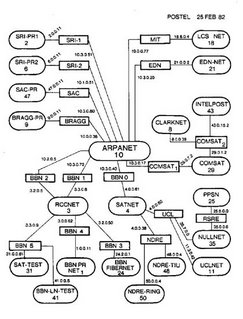How the Internet began
The Internet as we know it today owes its origins to the United States army
It was the Cold War and the Americans feared that if there was a nuclear attack, communications would break down.
So was born the germ of an idea for the Internet.
The first working model was set up in 1969 when four computers in separate locations were connected together.
Researchers at the University of California Los Angeles (UCLA), Stanford Research Institute (SRI), University of California Santa Barbara and University of Utah collaborated to make this happen.
The concept came from the Advanced Research Projects Agency (Arpa) at the United States Department of Defense which was looking at a new type of computer network to link computers on different networks.
The army specified that when one segment of the network was down, traffic should be diverted to a different route.
In this sense, the network never really 'dies' - it just finds an alternative way to get information through.
It is useful to visualise the Internet as a honeycomb of network connections.
If one path goes down, the network attempts another path, and so on, until eventually information finds its way to its intended destination.
From its original four-computer network, the Arpanet grew to 213 computers by 1971.
Research into the way data would be passed along the network (packet switching) and open architecture standards for communication (TCP/IP) led to its evolution into the Internet.
By 1985, the Internet had blossomed into a community of researchers and developers.
With the arrival of electronic mail, more people began to use it for daily communications.
When the World Wide Web and HTTP (hypertext transfer protocol) were developed, they allowed people to easily publish and share information. The result: the Internet's popularity took off.
- By Leslie Goh (from the Straits Times Interactive)




0 Comments:
Post a Comment
<< Home